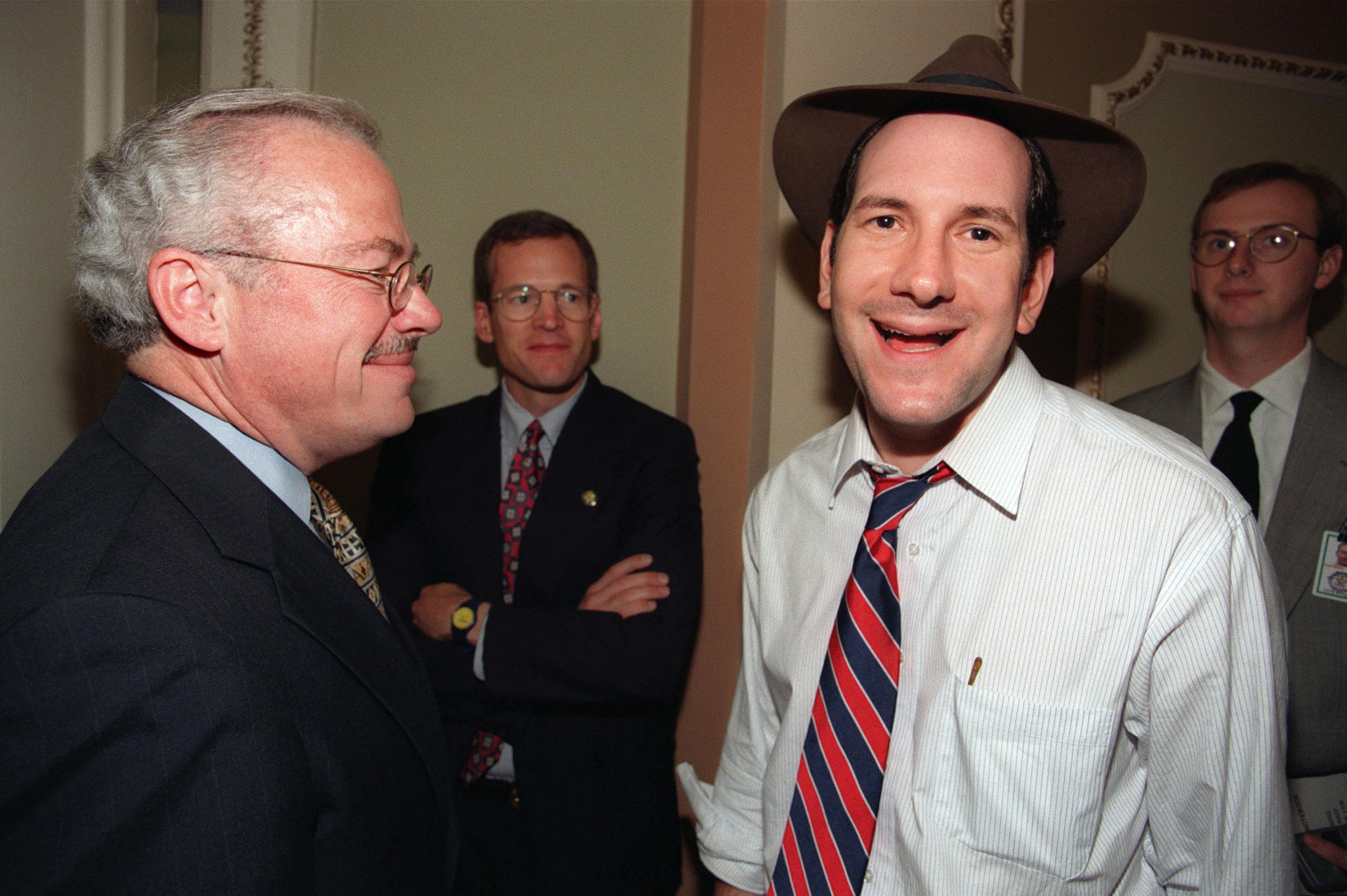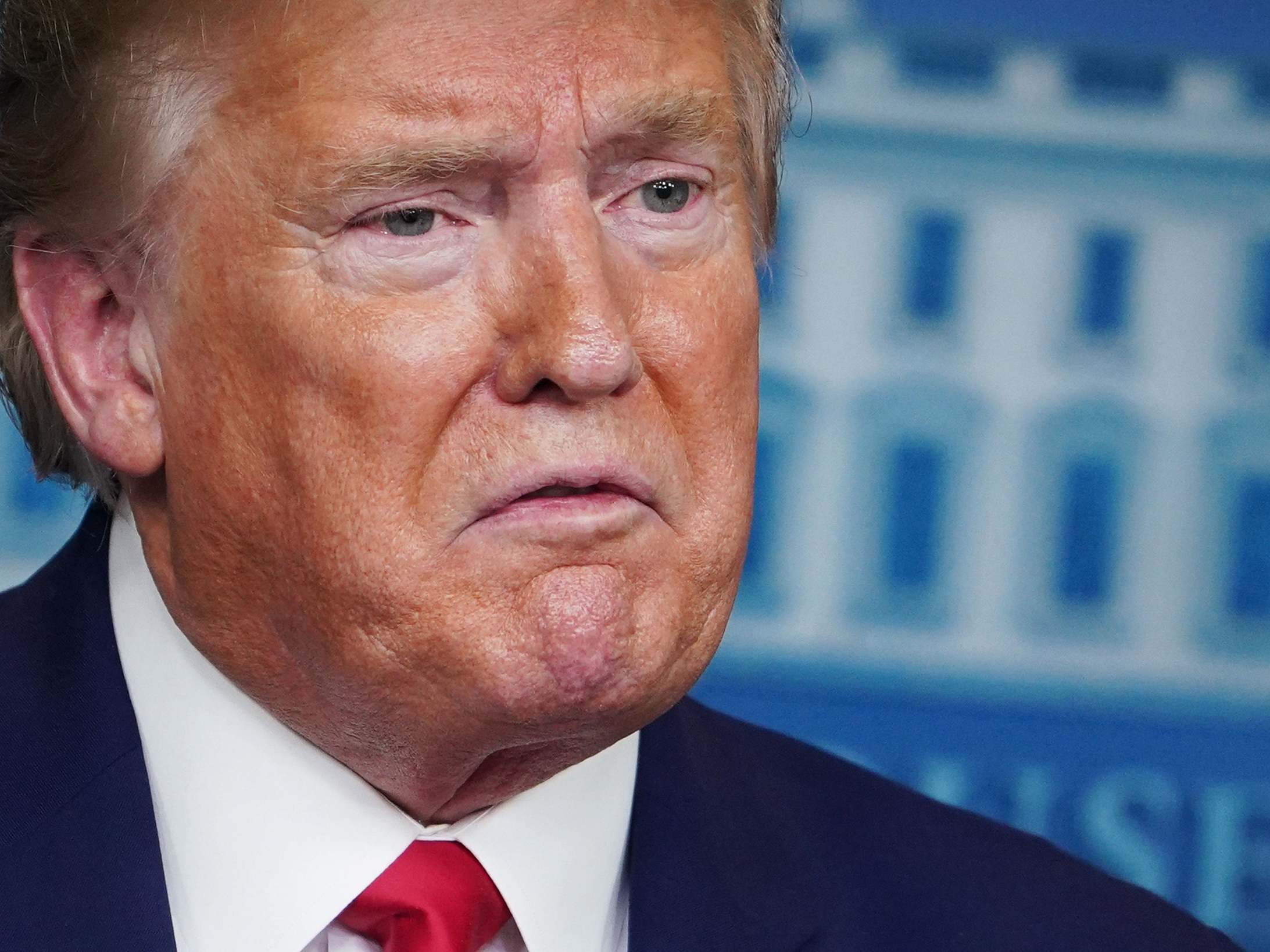Coronavirus: Drudge Report editor goes head-to-head with Trump after president’s Twitter attack
The cause of Trump’s disappointment was a report stating that the number of deaths in the US had set a single-day record
President Donald Trump’s on-again, off-again relationship with one of the most powerful figures in conservative media appears to be off again.
For reasons not entirely clear, Trump washed his hands of Matt Drudge, the digital news kingmaker, in a weekend tweet, saying he “gave up” on Drudge “long ago”.
The proximate cause of Trump’s disappointment with Drudge – or more directly, his influential Drudge Report news site – was his promotion of a report stating that the number of deaths in the US had set a single-day record. It carried an all-caps headline: “NO PEAK YET.” Trump framed his exasperation by retweeting a conservative writer who had called out Drudge’s headline as “sensationalistic & misleading.”
The president, who regards any hint of negative news as a personal betrayal, was clearly upset that Drudge had featured a story that undermines Trump’s repeated claims that the crisis is subsiding.
If Trump’s ardour for Drudge has truly waned, and the feeling is mutual, it would suggest a potentially consequential split. Without Drudge’s support, Trump would lose a powerful potential ally when he most needs him – during his campaign for re-election this year.
Drudge, the reclusive, hat-fancying pioneer of Internet aggregation, has been courted by Republican candidates, and the occasional Democratic one, since his Internet creation first became a traffic-grabbing monster in the late 1990s. He has since become one of the most important figures in the conservative media establishment.
Drudge was helpful to Trump during his 2016 campaign against Hillary Clinton, especially during the final weeks when the Drudge Report published screaming headlines falsely claiming that former president Bill Clinton had secretly fathered a child with another woman.
When Trump was inaugurated, Drudge proclaimed it as nothing less than the restoration of the nation. Its oversize headline was: “AMERICA AGAIN!” The favourable coverage prompted Trump to invite Drudge to the White House.

But Drudge went conspicuously rogue during Trump’s impeachment trial and subsequent acquittal. While most of the Trump-friendly media were all-in on Trump’s defence, Drudge took the case against the president seriously. His website ran all-caps headlines such as “REPUBLICAN CRACKS EMERGE” and “AMERICA BRACES FOR IMPEACHMENT” that weren’t Trump’s preferred narrative.
Trump’s blast at Drudge may be both payback for that presumed betrayal and for questioning his handling of the coronavirus crisis, said Tom Rosenstiel, the executive director of the American Press Institute.
“Trump seems to be a bit frantic about the way the pandemic is being perceived,” Rosenstiel said. “He wants to separate his supporters from what Drudge readers are seeing and reading. Clearly, Trump has to know that Drudge is important for him. But what’s bothering him more now is a situation that he doesn’t really control. Even some Republicans aren’t comfortable with some of his decisions.”

Drudge was an early internet pioneer, starting his site out of his West Hollywood apartment. His pivotal moment came on 17 January 1998, when Drudge broke the news that Newsweek was sitting on a story about President Clinton’s relationship with White House intern Monica Lewinsky.
The formula that Drudge established early on has remained much the same throughout the ensuing decades: The site doesn’t report or originate many stories itself; it simply links to the work of other news sources.
Visitors to his site effectively come for Drudge’s judgments on what’s worth knowing in the news. His understanding of the mass market’s tastes and interests is his singular contribution. (A Drudge acolyte, Andrew Breitbart, went on to start his own aggregation site, which later morphed into a far-right site with staff-written contributions.)
Drudge’s site has remained remarkably consistent over the years, both in its political shadings and in its graphical approach, which tends to resemble a typewritten term paper. On a typical day, the report will have a few small photos, but the dominant motif is its dozens of brief headlines.
Drudge also plays an important role in the larger digital-news ecosystem. A link on his site is a highly prized commodity among publishers, and typically sends waves of traffic barrelling to the linked article.
At the same time, Drudge remains one of the more reclusive and mysterious figures in the news business. Details about his operation, such as revenue and staff figures, are closely held. Drudge himself rarely makes public statements or gives interviews. He did not respond to a request for comment for this report.
He did, however, provide a brief statement to CNN in the wake of Trump’s tweet, which asserted that “People are dropping off like flies” from the site.
In fact, he said, “The past 30 days have been the most eyeballs in Drudge Report’s 26-year history. Heartbreaking that it has been under such tragic circumstances.”
According to Drudge’s internal figures, the site had 10.8 billion visits over the past year as of Monday, slightly more than 10.77 billion visits in the year before Trump’s inauguration in January 2017.
That kind of towering popularity probably helps Drudge forge his own path, said Rosenstiel.
“[Drudge is] not anyone who seems to care to pander to Republicans,” Rosenstiel said. “I can’t see him being intimidated. He follows his own star, and it has served him well.”
The Washington Post
Join our commenting forum
Join thought-provoking conversations, follow other Independent readers and see their replies
Comments
Bookmark popover
Removed from bookmarks